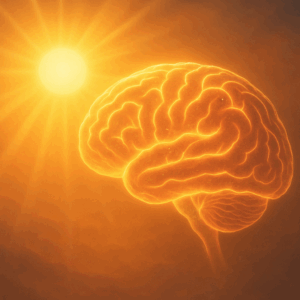Vitamin D and Mental Health: More Than Just the “Sunshine Vitamin”
 When we think of Vitamin D, bones and calcium usually come to mind. But in recent years, researchers have discovered that this “sunshine vitamin” has a far deeper role—especially in our brain and mental health. Low levels of Vitamin D are surprisingly common, even in sunny countries like India, and this silent deficiency may be affecting how we feel, think, and cope with life’s stresses.
When we think of Vitamin D, bones and calcium usually come to mind. But in recent years, researchers have discovered that this “sunshine vitamin” has a far deeper role—especially in our brain and mental health. Low levels of Vitamin D are surprisingly common, even in sunny countries like India, and this silent deficiency may be affecting how we feel, think, and cope with life’s stresses.
🧠 How Vitamin D Affects the Brain
Vitamin D isn’t just a vitamin—it acts more like a neurosteroid hormone. Receptors for Vitamin D are present in key brain areas like the prefrontal cortex and hippocampus, which regulate mood, memory, and emotions.
Here’s what Vitamin D does for the brain:
-
Boosts neurotransmitters like serotonin and dopamine (linked to happiness and motivation).
-
Protects brain cells through antioxidant and anti-inflammatory effects.
-
Supports neuroplasticity, the brain’s ability to learn and adapt.
-
Regulates stress response via the HPA axis.
💡 Vitamin D and Mental Health Conditions
-
Depression
-
People with low Vitamin D are more likely to experience depressive symptoms.
-
Supplementing Vitamin D can help improve mood, especially when deficiency is present.
-
-
Anxiety
-
Emerging evidence suggests deficiency may worsen anxiety and stress sensitivity.
-
-
Schizophrenia & Bipolar Disorder
-
Vitamin D plays a role in early brain development. Deficiency during pregnancy or childhood has been linked to higher risk of schizophrenia.
-
In bipolar disorder, low Vitamin D may be linked to more severe mood episodes.
-
-
Cognitive Health & Dementia
-
Deficiency has been associated with faster cognitive decline and dementia risk in older adults.
-
-
Suicidal Risk
-
Low Vitamin D levels are also linked to increased suicidal thoughts in some studies.
-
🌞 Getting Enough Vitamin D
-
Sunlight: 15–20 minutes of morning sun exposure (face, arms, legs) is usually enough.
-
Diet: Include fatty fish (salmon, mackerel), egg yolk, fortified dairy, and mushrooms.
-
Supplements:
-
For deficiency: High-dose regimens (e.g., 60,000 IU weekly for 6–8 weeks) under medical advice.
-
For maintenance: 1,000–2,000 IU daily or equivalent.
-
✅ Key Takeaway
Vitamin D is not a magic pill for mental illness, but it matters more than we once thought. Correcting deficiency can improve mood, energy, and cognition, and may even reduce risk of serious psychiatric disorders. If you often feel low, anxious, or mentally fatigued—checking your Vitamin D levels might be a simple but powerful first step.
✍️ Dr. Srinivas Rajkumar T
MD (Psychiatry), AIIMS New Delhi
Consultant Psychiatrist – Child, Adult & Geriatric Psychiatry
Apollo Clinic, Velachery, Chennai
📞 Contact/WhatsApp: 85951 55808